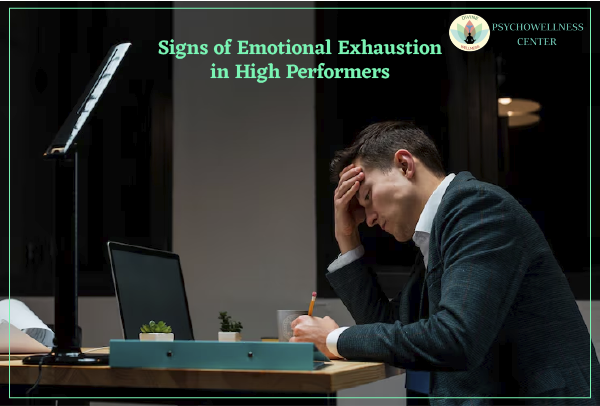In today’s fast-paced world, high performers are often admired for their drive, discipline, and ability to multitask. These individuals are usually seen as successful, dependable, and constantly on top of things. But what many people don’t see behind the scenes is the silent toll this lifestyle can take, especially when emotional health is pushed aside. This is where emotional exhaustion steps in, a common but often overlooked condition that affects even the strongest performers.
Emotional exhaustion is more than just feeling tired. It’s a deep sense of being emotionally drained, mentally worn out, and having nothing left to give. For high performers, it can creep in quietly, masked by their own high standards and busy schedules. Left unchecked, it can lead to burnout, anxiety, depression, and even physical health issues.
What is Emotional Exhaustion?
It happens when someone experiences prolonged stress without proper rest or emotional support. According to psychology, it’s a key component of burnout, a condition recognised by the World Health Organisation (WHO) as an occupational phenomenon (WHO, 2019).
Unlike physical fatigue, emotional exhaustion affects your motivation, ability to focus, patience, and capacity to care. It often makes people feel detached, unmotivated, and emotionally numb.
Why High Performers Are at Risk
They might also struggle to say no or delegate tasks, which can lead to overcommitment and exhaustion. These individuals are often perfectionists, people-pleasers, or caregivers—traits that can make it harder to rest or seek help when overwhelmed (Maslach & Leiter, 2016).
Key Signs of Emotional Exhaustion in High Performers
Recognizing the signs early can help prevent burnout. Here are some common indicators that a high performer might be emotionally exhausted:
- Constant Fatigue That Rest Doesn’t Fix:- High performers may still get enough sleep or rest, but wake up feeling drained. This persistent fatigue doesn’t go away with a weekend off or a vacation. It stems from mental and emotional overload rather than just physical tiredness.
- Loss of Motivation or Passion:- People who once loved their work may find themselves dragging through the day, unable to care about their goals or tasks. They may still perform at a high level, but internally, they feel disconnected and uninspired.
- Increased Irritability and Frustration:- Small things that never used to bother them now cause frustration. Patience wears thin, and emotional reactions become stronger or more frequent. High performers may snap at coworkers, friends, or family, even if they don’t mean to.
- Withdrawal from Social Connections:- Emotionally exhausted individuals often isolate themselves. They may cancel social plans, avoid colleagues, or become emotionally distant in relationships. This is not out of anger but because they feel they have no emotional energy left to give.
- Self-Doubt and Imposter Syndrome:– Despite their accomplishments, high performers may begin to doubt their abilities. They feel like they’re not doing enough, even when they are. This can lead to overworking and perfectionism, which worsens the emotional exhaustion.
- Trouble Sleeping or Unhealthy Sleep Patterns:– Sleep issues are a major sign. Some may have insomnia, while others sleep excessively but still wake up tired. Poor-quality sleep fuels emotional fatigue and makes it harder to recover.
- Numbing Behaviours or Coping Mechanisms:- Some high achievers may turn to alcohol, overeating, excessive screen time, or overworking to escape their feelings. These behaviors might offer temporary relief but make emotional exhaustion worse in the long run.
Why Addressing Emotional Exhaustion Matters
Emotional exhaustion not only impacts mental health it also affects physical health, decision-making, productivity, and relationships. If ignored, it can lead to full-blown burnout, depression, or even chronic illnesses like heart disease (Shirom, 2009). Addressing emotional exhaustion is not about giving up or becoming less driven.
How Counselling Can Help
Talking to a psychologist or counsellor can help high performers understand the root of their exhaustion. Counselling provides:
- A safe, non-judgmental space to explore thoughts and emotions
- Tools to set healthy boundaries and manage stress
- Help with challenging perfectionism and impostor syndrome
- Support in building emotional resilience and self-awareness
Cognitive Behavioural Therapy (CBT), mindfulness-based stress reduction, and solution-focused therapy are often helpful approaches for managing emotional exhaustion.
Small Steps to Prevent Emotional Exhaustion
- Practice saying no without guilt
- Schedule regular downtime, not just when burnout hits
- Celebrate small wins and avoid chasing perfection
- Check in with your emotions regularly
- Reach out for support from friends, or therapists
Avoid over-identifying with achievements, you are more than your productivity
Conclusion
High performers may seem unstoppable on the outside, but emotional exhaustion can slowly break down even the most resilient individuals. Understanding the signs and taking action early is key. Remember, it’s okay to rest, to feel, and to ask for help. Mental health is not a weakness, it’s the foundation of sustainable success.
Contributed by Ms. Sakshi Dhankhar, Counselling Psychologist.
References
- Maslach, C., & Leiter, M. P. (2016). Burnout: A Multidimensional Perspective. In Cooper, C. L. & Cartwright, S. (Eds.), The Oxford Handbook of Organizational Well-Being. Oxford University Press. https://doi.org/10.1093/oxfordhb/9780199211913.003.0005
- Shirom, A. (2009). Burnout and health: Expanding our knowledge. Stress and Health, 25(4), 281–285. https://doi.org/10.1002/smi.1283
- World Health Organization (WHO). (2019). Burn-out an “occupational phenomenon”: International Classification of Diseases. https://www.who.int/mental_health/evidence/burn-out/en/

